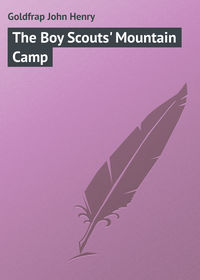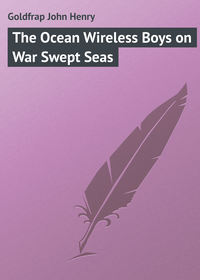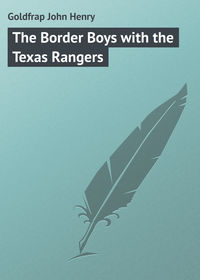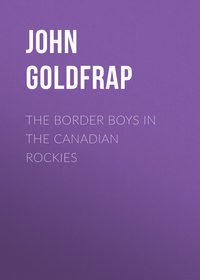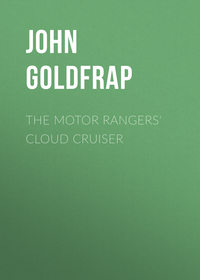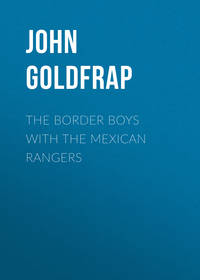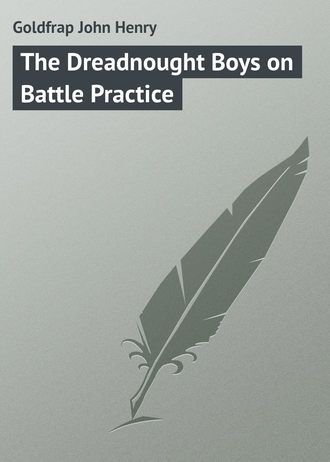 полная версия
полная версияThe Dreadnought Boys on Battle Practice
As the petty officers were at dinner, however, and the commissioned dignitaries were enjoying a smoke aft, there seemed little likelihood of any interference before the contest was ended. The men were fighting in the shelter of the turret, so from the bridge nothing of what was transpiring was visible to the navigating officers or the quartermasters.
"You young hound, I'm going to kill you!" hissed Kennell, white with rage, as, for the twentieth time one of his terrific swings met thin air.
"Catch me first!" mocked Ned, skipping backward with agile footwork.
Kennell, who was breathing heavily, seemed fairly to spring at the lad as he spoke, but Ned nimbly sidestepped, and Kennell went careening ahead like a man shot out of a suddenly checked auto.
"Keep your wind to fight with!" advised Ned jeeringly. But, alas for his confidence, as he spoke his foot caught on a deck ring he had not observed, and he fell backward, sprawling.
He was up in a breath, but Kennell, with a roar of triumph, was on him in a flash.
The bluejacket's great arms, hairy as a bear's, shot out and encircled Ned in a grip that threatened to crush his ribs in.
It was a lock grip.
Ned, as the breath was slowly crushed out of his body, felt as if the fight had ended.
He saw defeat, utter and absolute, staring before him.
Perhaps this thought gave him almost superhuman strength, for the next minute, with an agile twist, he had writhed clear of the deathly grip and had in his turn laid hold of the bully in a wrestling clutch.
It was the ancient "grapevine," and Kennell smiled a cold, deadly smile as he felt and knew the old school-boy grip. Throwing it off as easily as if it had been the clutch of an infant, he crouched, and, rushing in, caught Ned craftily about the middle; but Ned, slipping aside, gripped the sailor with a peculiar twist, and seemingly with no great exertion, shot him over his head.
The tars set up a cautious shout.
It was an old trick of wrestling, in which Ned was perfectly at home; but, to his amazement, the agile Kennell fell on his feet as lightly as a cat, instead of crashing to the deck as Ned had expected.
The bluejacket, brute though he was, was just as evidently a master wrestler and up to all the tricks of the game.
Indeed, as Ned watched his confident leer as he recovered from what the boy had expected to be a crushing overthrow, there was an expression on the fellow's crafty face that struck a chill that was almost one of dread into Ned's heart.
As for the jackies, they watched in silent fascination.
Not a sound was to be heard but the quick "patter-patter" of the wrestlers' feet on the decks as they "sparred" for a fresh opening.
Suddenly Kennell crouched low, and, before Ned could check him, was once more upon the boy.
But now his tactics were wholly changed.
His method of wrestling was unlike any that Ned had ever seen or heard of.
Yet how deadly it was the boy quickly began to experience.
Kennell's fingers, spread like the talons of a hawk, glided here and there about the lad's body rapidly as the undulating movements of a snake. Wherever they touched, the boy felt a sharp shock of intense pain shoot through his frame.
Beads of cold perspiration jetted out on his forehead.
A numbing sickness seized hold of him.
And still Kennell's deadly fingers pressed here, there, and everywhere, bringing the sickening agony that Ned had already tasted in their wake.
The very fact that he could not understand what was happening added to the boy's alarm.
He had been in many wrestling matches. In fact, he was a better performer on the mat than with the padded gloves, but in all his experience he had never met an opponent like Kennell.
Clumsily built as the man was – he had not an iota of the agility possessed by the lithe and supple Ned – yet he seemed to wind and twist like a sapling under Ned's holds; recovering from each grip, he laid his hands on the boy with the same deadly precision.
Ned began to feel that his nervous system was a pincushion for his opponent to puncture at will.
The old hiplock, the Nelson, the half-Nelson, the grip at the back of the neck – all these tricks of the wrestler's craft Ned tried in turn, but none of them seemed to have any effect on Kennell.
And all the time the bluejacket kept up his deadly assaults on Ned's nerve centers, pressing them deftly and producing excruciating pain.
Once Ned wrenched free, and glad he was of the brief spell in which he could take stock of his remaining faculties.
It was not that he was winded, or that Kennell was too strong for him. In fact, Ned felt that, well-muscled as the bluejacket was, he had his own system in better fighting shape.
The strange methods of Kennell were what worried him. He could not seem to escape the assaults of those hawklike hands.
Suddenly a partial explanation of the mystery came to him.
Old Tom stepped forward and whispered in his ear, during the brief period in which the two sprang about, eying each other narrowly.
"He's jiu-jitsu! Look out!"
The full meaning of these words shot into Ned's brain.
He recollected now having heard some talk about Kennell's having served in the Far East on his first enlistment.
Doubtless it was there that he had learned the subtle, deadly Japanese tricks that he was now exercising on his inexperienced opponent.
Gladly would Ned have come to open boxing. In a ring, under proper rules, he was well convinced he could whip the burly Kennell; but under the conditions he now faced, he was by no means certain of his ultimate chance of victory.
And now Kennell, with his snakelike glide, closed in again, and Ned seized him without warning in a half-Nelson.
Back and back bent the bulky form of the bluejacket till it seemed that his vertebra must crack under the cruel pressure.
But to Ned's sickened amazement, the other wriggled from the hold as if he had been some reptile, and there was the work all to be done over again.
One fact, however, Ned noticed with satisfaction.
If he was becoming exhausted, Kennell was also tiring. His breath was coming sharply, with a hissing intake, like that of a laboring pump.
The strain was telling on him.
Ned felt, if he could only hold out a little longer, that he would lay his opponent low.
But could he last?
The contest now was simply a matter of brute endurance plus skill, and in the latter quality Ned felt that Kennell, in his Oriental way, possessed the advantage.
Suddenly Ned found himself with a grip on both of Kennell's arms at once.
A flood of joy rushed through his veins. He felt certain that few men could resist the pressure he could now exert with his mighty forearms and biceps.
"Now where are your jiu-jitsu tricks?" he hissed, as he drew the struggling Kennell nearer and ever nearer with the same resistless force as is exerted by the return plunge of a piston.
Kennell, his face white, with an ashy tinge about the corners of his mouth, said nothing, but fought with every ounce of strength within him against the steady pressure that was drawing him closer and closer into Ned's crushing embrace.
As Ned had said, "Where were his jiu-jitsu tricks now?"
The breathing of the two men came in short, sharp barks that sounded hoarsely as coughs as they stood straining there in a deathlike lock.
For a second or two all motion ceased, and they stood, except for the working of their opposed muscles, like two stone figures.
The next instant, however, the slow, irresistible force of Ned's compressing arms overcame Kennell's stubborn resistance, and the bluejacket was dragged yet nearer into the toils he dreaded – dreaded with white, frightened face and beaded brow.
But even as Ned prepared to throw him with a mighty crash to the deck, a strange thing happened.
Kennell's body grew limp as a half-filled flour sack and slid like an inert mass down Ned's body.
The next instant the boy felt his ankles gripped in a steel-like hold, and, utterly unable to resist, he was toppled over to the deck. As he fell, one of Kennell's big hands slid round to the back of the Dreadnought Boy's neck, and Ned simultaneously experienced a queer, fainting feeling, as if he were being borne far away from the Manhattan and his surroundings, up, far aloft, into the fleecy clouds.
Again the hand struck, so softly it seemed as if his neck had been merely stroked, but the sense of illusion increased.
Ned's eyes closed.
Suddenly – just as it seemed to the boy that he was entering a delightful land, where flowers bloomed luxuriantly and birds sang the sweetest song – a sharp voice shattered his illusion like a soap bubble.
"Ned! Ned, old chap! Get him, for the love of Mike!"
It was the red-headed Herc released from his cell ahead of time by the captain's commutation of sentence.
Like a steel spring suddenly released, Ned's body curved upward, and the next instant the wily Kennell's body was in his close embrace.
This time Ned had caught him where all his Oriental tricks were of no avail.
Back and back he bent Kennell till, with a great gasp, the bluejacket crashed down to the deck, his head striking with a heavy thud.
"Downed him!" shouted old Tom, capering.
"The kid wins!" yelled the delighted jackies.
Kennell, dazed and astounded at his sudden loss of the match he had made sure was his, got clumsily to his feet.
"Shake hands," said Ned simply, extending his palm. "I don't like you, Kennell, but I think you are the cleverest wrestler I have ever met."
With a scowl of fury and a half-articulated cry of rage, Kennell dashed the outstretched hand from him and hastened away from the jeering cries of his shipmates, with whom, as has been said, he was by no means popular.
"Well, if he doesn't care to be friends," remarked Ned, as the jackies, led by Herc, crowded around him and shook his hand warmly, "he doesn't have to. I suppose we shall have to take the consequences."
What those consequences were to be neither of the Dreadnought Boys dreamed at that instant. Perhaps it was as well they did not.
While the congratulations were still going on, a boatswain's mate came bustling up.
Perhaps he detected the symptoms of something unusual having occurred in the excited faces of the jackies and in Ned's still heaving chest and flushed face, but he was too wise a man to inquire into something he had not witnessed with his own eyes. As it was, therefore, he simply contented himself by inquiring for Kennell.
"With the gun crew," suggested one of the throng.
"He won't be long," replied the boatswain's mate shortly and with a meaning look.
"Why not?" asked old Tom, the privileged character.
"Because, my boy, he has been relieved from duty in the forward turret and the two recruits put there in his place."
"Phew!" whistled the jackies, as the boatswain's mate hurried forward on his quest.
"Now look out for squalls!"
CHAPTER XVIII.
THE BOYS GET ACQUAINTED WITH BIG GUNS
Two days later the squadron sighted what at first seemed – to the boys, at least – to be a distant cloud of deeper blue than the surrounding sky. It floated on the southern horizon.
"Cuba!" announced old Tom, who, with the boys, was standing on the fore deck in the "smoke time" succeeding the jackies' dinner.
"How soon will we come to anchor?" inquired Herc.
"About sundown," was the reply. "You boys are in for some strange sights and experiences down here."
If Tom had been a prophet of old, he could not have spoken more truly. The boys were indeed "in for some strange experiences."
That afternoon the gun crews were set to work on their various pieces of ordnance, and "dummy drill" was gone through again and again till the officers were hoarse with shouting commands.
In the forward turret, Ned and Herc, the proudest bluejackets of all the Manhattan's ship's company, were drilled again and again in their part of the gun-pointing and sighting performance.
Just as in actual practice – only these were dummies – the projectile, shining and menacing, and the bags of make-believe smokeless powder were sent up from the magazines on the electric ammunition hoists. From these they were rapidly transferred by the gun crew, who used a sort of wooden trough in the process.
"Like the hog troughs we put the mash in at home," mused Herc, as he laid hold of one of the six handles on the trough and did his best to fall into the rhythmic swing with which the men obeyed the sharp series of commands issued by the officer, who was Lieutenant Timmons himself.
"Take up LOAD!"
The projectile was laid in the trough almost as fast as it was shot up on the elevator. As the last echoes of the command rang sharply on the steel walls of the turret, the implement was reposing in its "bed."
"Swing LOAD!"
By this time the shining breech – as fine as the mechanism of a three-hundred-dollar stop watch – was swung open by the breech tender. It was then only the work of a second to flash the projectile into the glistening chamber.
"Ram HOME!"
With one quick movement, that seemed to occupy no longer period than the tick of a clock, the projectile was slid to its proper place by a long wooden rammer.
All this time the gun pointer – Jim Cooper by name – alert, watchful as a mousing cat, was crouched on a little platform at the side of the gun, sighting an imaginary mark through a telescope affixed to the gun's side.
The lens of this sight was marked with tiny, hairlike crosslines, affording the pointer the means of determining with almost unerring accuracy, the exact second at which the target and the gun were in line. In a heavy seaway, of course, or even in a moderate blow, the work of the gun pointer is much more complicated, as a dozen different elements and movements are at work to confuse and spoil his aim.
Then came the powder charge. Several canvas bags appeared on the ammunition hoist.
"More like flourbags than powder," thought Herc to himself, as he helped slap them into the carrying tray.
"Ram HOME!"
The powder was shoved in with the same flash-like rapidity that had marked the placing of the huge projectile.
"Ready, sir!"
The chief of the loading crew saluted.
"Ready, Cooper?"
"Aye, aye, sir!"
"Close breech! FIRE!"
The two commands seemed to be merged into one, so rapidly did they come. The boys and the rest of the crew sprang to the back of the turret and crouched low, as did the others as the command was given.
The gun pointer came last of all, springing backward like an acrobat. As he did so there was a sharp click. The lieutenant in command had thrown the switch that ignited the priming spark. The mighty charge had been touched off – in imagination.
The lieutenant looked at his watch, which he had held on his open palm while the crew worked.
"Twenty-five seconds! Good work," he announced. "Do as well as that at battle practice, men, and we shall beat the Idaho to rags – on speed, at all events."
"And on targets, too," grimly remarked Cooper, wiping his nervous hands with a bundle of waste.
This was the final practice of the afternoon, and the rest of the time was devoted to familiarizing the two young recruits with their duties about the turret.
Both were quick pupils and had already studied something of gunnery at the Newport Training School, so that in a short time they thoroughly understood the theory of firing the big guns.
With quick eyes both lads had noticed that the other twelve-inch gun – the Varian projectile hurler – had not been unhooded, and its grim breech was swathed mysteriously in waterproof coverings. It was in the breech that lay the complicated mechanism which made it possible to handle the terrific explosive power of Chaosite – at least, so the inventor hoped.
As a final lesson, the boys were instructed in the elementary theory of gun pointing, a much too technical subject to enter into here.
Herc was amazed when he took his place on the gun-pointer's little steel platform, to find that by handling a lever close to his right hand he could point the ponderous gun, weighing fifty-four tons, up or down as easily as he used to sight his little "twenty-two" when he went shooting "chucks" at home.
"That great gun is balanced as delicately as a microscope," explained the lieutenant.
"How do you get it in lateral range?" inquired Herc.
For reply, the lieutenant indicated another lever.
Herc touched it.
Instantly the great turret itself began to quake, and then, with a soft rattling of cogs, commenced slowly to revolve.
"Reverse it!" shouted the lieutenant.
Herc pulled the lever in the other direction.
As obediently as if it had understanding, the tons of triple-riveted steel which composed the shelter for the heaviest guns in the navy began to turn in the opposite direction.
"Electricity," laughed the officer. "Electricity is the life-blood of the modern battleship. A vessel like this has a more complicated system of circulation than the human body. We eat by electricity, fire the guns by it, read by it, cook by it, coal by it, and – "
"Fight by it, sir," put in Ned quietly, carried away by enthusiasm.
The lieutenant gave him a quick look, as if to rebuke him for his forwardness; but the shining light in the boy's eyes showed the officer that, after all, it was real enthusiasm for the United States fighting ships that had incited Ned's remark.
"Yes," he said quietly also, "and fight by it, too, Strong."
This concluded the great-gun drill, and the boys and the crew of the forward turret joined the other tars assembled on the forward deck, awaiting the sounding of the supper call. All over the ship, down to the marine's little six-inch batteries, the same practice had been going forward.
Already they felt set apart somewhat from their comrades, and proud in the thought that they were part of the fighting force that commanded the actions of the biggest guns in the fleet. That it really did confer a sort of distinction upon them was evidenced, too, by the increased cordiality with which their shipmates greeted them.
"Hurray! we're on our way to be admirals," whispered Herc to Ned, as they passed among the groups of resting jackies, returning the running fire of joking and congratulation to which they were subjected on every hand.
"Only a very little way," laughed Ned, "though I feel as proud as if that was my flagship yonder and I was entitled to fly the two-starred blue flag."
He pointed to the van of the squadron – the big Connecticut– on which flew the flag of Rear-Admiral Gibbons.
"If we do our duty as well as we can," he went on seriously, "we are just as important to the fleet as any of the officers or our superiors."
"I guess that's right," agreed Herc. "At any rate, that's just what I heard the captain saying the other day to two men who had the misfortune to be my cellmates, and, by the way, that reminds me – "
Herc drew Ned into a quiet niche – a hard place to find on the busy, crowded fore deck of the man-o'-war – and in whispers told him of the conversation he had overheard.
"Ought we to tell the captain?" he concluded.
Ned hesitated.
"I don't think so. Not yet, at any rate," he decided after an interval of thought. "We shall have shore leave at Guantanamo, I understand, and we will employ it by keeping close on the track of those two fellows. Neither of them imagine we know their plans, so that we have that advantage, and we may be able to do something that will bring us really in the line for promotion. I wonder how Kennell got into it, though?"
"I suppose the fact that he was familiar with the Varian gun, from his detail in the fore turret, had something to do with their bribing him," suggested Herc. "However, we may be on the eve of finding out."
Destiny was holding big things in reserve for the Dreadnought Boys.
CHAPTER XIX.
IN THE MIDST OF PEACE
As the sun was sinking that night in a blaze of red and gold behind the green-bowered coast of Cuba, the boys, leaning over the starboard rail with hundreds of other white-uniformed jackies, saw a sudden signal broken out on the after signal halliards of the flagship.
"Coming to an anchorage," exclaimed old Tom, as the string of gayly colored signal flags fluttered out. "There's Guantanamo yonder." He pointed to a huddle of red roofs set among tall palms.
"The signal's for flying moorings!" exclaimed Herc, who, as well as Ned, had received a thorough schooling in signaling at the training school.
"That's right," rejoined old Tom approvingly, "flying moorings it is."
And now all became activity throughout the fleet. Aboard the Manhattan, and, indeed, on every other ship of the squadron, the most active bustle prevailed.
Coming to "flying moorings" is one of the greatest tests of a captain's ability to handle his ship, and right well did every commander in that squadron of ten mighty fighting ships show that he was entitled to wear his uniform.
Master's mates flew about among the crew of the Manhattan, and a shrill sound of piping arose as the men assigned to the various posts connected with dropping the vessel's "mud hooks" hastened to their stations.
"Look close now! You are going to see something worth watching," said old Tom, as the crucial moment drew near.
On the flagship ahead the lads saw motion suddenly cease, following a mighty splash as her huge anchor shot downward twenty fathoms or more, and her engines ceased revolving for the first time in many days.
At the same instant the boys' hands instinctively flew to their caps in a prompt salute as Old Glory broke out on the rear-admiral's jackstaff and fluttered in the evening breeze, a sign that the ship was at anchor.
On the bridge of the Manhattan, Captain Dunham, his officers in full uniform at his side and an attentive midshipman at his elbow, was watching his flagship anxiously. As she swung to her anchor a sharp command was barked out:
"Slow down!"
The middy's hand shoved the engine-room telegraph indicator over, and instantly the strong vibration of the engines began to diminish. It felt strange, this sudden cessation of a sound and motion that the boys had come to regard almost as second nature.
"Let go the star-bo-ard an-chor!"
"Aye, aye, sir!" shouted a watchful boatswain's mate, springing forward.
Instantly a shrill screeching of whistles broke out, and with a mighty roar the great anchor of the Manhattan shot from the cat-heads and plunged into the water.
After it roared thirty fathoms of chain before the further screams of the pipes stopped the rapid "paying out" of the iron-linked cable. The Manhattan, her engines idle at last, came to an anchorage.
"Caught her to the eighth of an inch, sir!" remarked Lieutenant-Commander Scott to his chief.
Sailor-like pride wreathed the faces of every man on the bridge.
The Manhattan swung at anchor behind her flagship at precisely the same distance as she had steamed in column behind her all the long voyage from New York. It was a feat to be proud of, and called for a high degree of seamanship.
Behind the Manhattan the other vessels came to similar moorings, the Stars and Stripes fluttering out from the stern staff of each as the anchor touched the bottom. It was a sight to make the heart of a patriot beat proudly. Ten of the finest ships in the United States Navy swung at exact intervals in a perfect line. The flag of their country whipped out from the stern staff of each, as if in defiance of their country's foes.
Hardly had the anchor of the Iowa, the last ship in line, dropped before from the flagship another signal was broken out.
"Well done!" read Ned, studying the bright bits of bunting. "Congratulations to officers and men."
A great cheer went up from the fore deck of the Manhattan, and its echoes went winging down the line of grim fighting craft and was caught up by ship after ship.
At almost the same instant the sun dipped behind the coast hills, and the bugles began to sound the musical call of "Retreat."


